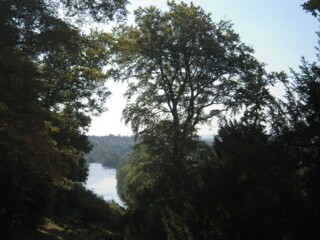At Cliveden
Inigo Thomas
From the terrace at Cliveden, with its western and southern panorama, the Thames and its floodplain are partly obscured by woodland, and so yesterday you couldn't judge the extent of the flooding in the valley below. But that didn't appear to matter to the large number of people visiting the house and its gardens, on the first gale-free day in some time, many of whom had turned out to see what they could of the floods. Disaster tourism?
Cliveden is now a hotel set in National Trust grounds. It was once famous for its social and political life: it's the place where 'Rule, Britannia' was first sung; it's where the Astors courted appeasers, and didn't discourage anyone from thinking that they and their friends were a shadow government, although they were always less powerful than they thought they were; and it's where John Profumo met Christine Keeler, which has never struck me as the world-historical event that some people have made it out to be.
The word 'Cliveden' is derived from 'clief-den', or cliff-den: there's an escarpment through those river-obscuring woods. The name is not, then, derived from anything grand, such as, say, Clive of India, though such is the scale and scope of the architecture of the house and its setting you could be forgiven for thinking, instinctively, that it did. Garibaldi, standing on the terrace 150 years ago, looking out over the valley and the Berkshire countryside, was so wowed by what he saw that he compared the scene to something he'd known in South America. Perhaps he was trying to flatter his hosts: you can't really imagine the Thames, even in fullest flood, as the Amazon or the Orinoco. Not everyone has been impressed; Lucy Cavendish found Cliveden overbearing. 'The perfect taste, refinement and luxury of the place almost oppresses me,' she said.
For the hoteliers who now run the house, perfect taste, refinement and luxury are what it is all about – as well as some but not all of its history.Cliveden was once 'the hub of a hectic social whirl,' its website says. The alliterative theme can be found elsewhere: 'Discover the the scurrilous secrets of the times on our Profumo Affair Break at Cliveden House, and find out all about the how the political establishment thawed.' Thawed?
There's no room in the hotel's promotional material for Claud Cockburn, who labelled the house a schloss and coined the phrase the 'Cliveden set' to describe the Astors and their appeasement pals. Soon after the Astors moved into Cliveden, Waldorf Astor became so concerned about the possibility of his son being kidnapped that he built walls around the grounds. Stanley Spencer's sister Florence renamed him 'Walled-Off' Astor.
Over the river from Cliveden is Cookham, the small town on the Thames that Spencer believed was Heaven on Earth. It is, it's fair to say, very pretty. Yesterday, two children walking on a road across the common flooded by only an inch or two looked from a distance as if they were giving a pretty good impression of walking on water. The Thames for Spencer wasn't the Amazon or the Orinoco, but the Jordan: Christ arrives at Cookham by punt.
Swans, punts, bridges – they feature in many of Spencer's paintings. In 1947, Cookham was flooded; it had been cold enough for the Thames to freeze over at Windsor and and then heavy rain fell on frozen ground. Without the soil to soak up the water the Thames burst its banks. A report on that year's flood began by making the observation that 'the behaviour of the flood was true to type,' and that it was similar to floods in 1774 and 1894.
Another report about another flood, this one in 1877, speculated about factors that might have made the flooding worse. 'The gradual diminution of woods and coppices, the removal of high, luxuriant hedges which characterised the days of old fashioned farming, and the modern system of drainage may possibly have had some influence in producing the alternate droughts and floods from which we have suffered for some years past.' Clive Aslet made much the same argument about the floods of 2014 in the Telegraph last week. How reassuring is it that the same questions about floods, flood plains, embankments and water have been asked for 150 years?
